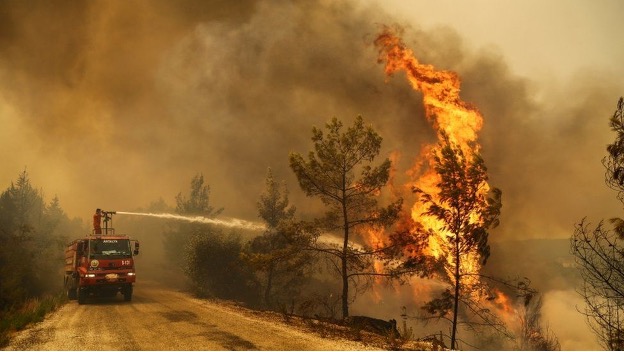July Temperatures Break Heat Records
| By Emma Kuruppacherry |
This July was the hottest month in documented history. With a global temperature high of 17.08°C (62.74°F), July 2023 broke records from the previous hottest month, July of 2019, and the average temperature in July from 1991 to 2020. In fact, according to Leipzig climate scientist Karsten Haustein, “We may have to go back thousands if not tens of thousands of years to find similarly warm conditions on our planet”. Findings from ice cores and tree rings indicate Earth hasn’t been this hot in over 120,000 years.
Effects from the heat were felt all over the world. Wildfires in the Greek island of Rhodes sent thousands of tourists fleeing. Temperatures in a northwest township in China reached 52.2°C (126°F) breaking their national record. Canadian wildfires burned faster than ever before. And several countries in Europe experienced a major heatwave. Even in the Antarctic ice melted to an all-time low, with the monthly value 15% below average. Samantha Burgess, Deputy Director of the Copernicus Climate Change Service (C3S) said, “We just witnessed global air temperatures and global ocean surface temperatures set new all-time records in July. These records have dire consequences for both people and the planet exposed to ever more frequent and intense extreme events”. Scientist Friederike Otto at the Grantham Institute for Climate Change said, “Global mean temperature [itself] doesn’t kill anyone. But a ‘hottest July ever’ manifests in extreme weather events around the globe”.
Part of the cause for the unusual heat came from the weather phenomenon known as El Nino. During this time warm water builds up in the eastern Pacific. As the water circulates around the world, it raises the global temperature. However human-caused climate change added immensely to El Nino’s effects. Scientists attribute the records to excess heat within the atmosphere generated by burning fossil fuels. The World Weather Attribution Group said the heatwaves in Europe and North America were “virtually impossible” without the addition of climate change. China’s heat wave was also 50 times more likely to occur in our present environment. U.N. Secretary-general Antonio Guterres said, “Climate change is here. It is terrifying. And it is just the beginning, the era of global boiling has arrived”. El Nino’s temperatures are expected to peak later this year and into 2024.
Leipzig University, the World Meteorological Organization (WMO), and C3S released a study stating that July was roughly 1.5°C (2.2°F) above preindustrial levels, the warming limit set by the Paris climate accord. While we have not yet gone past the point of no return, the study warns Earth is well on its way without immediate action against greenhouse gas emissions. The WMO’s secretary-general Petteri Taalas in the WMO-C3S press release said, “The need to reduce greenhouse gas emissions is more urgent than ever before. Climate action is not a luxury but a must”.
Photo Credit: Reuters



